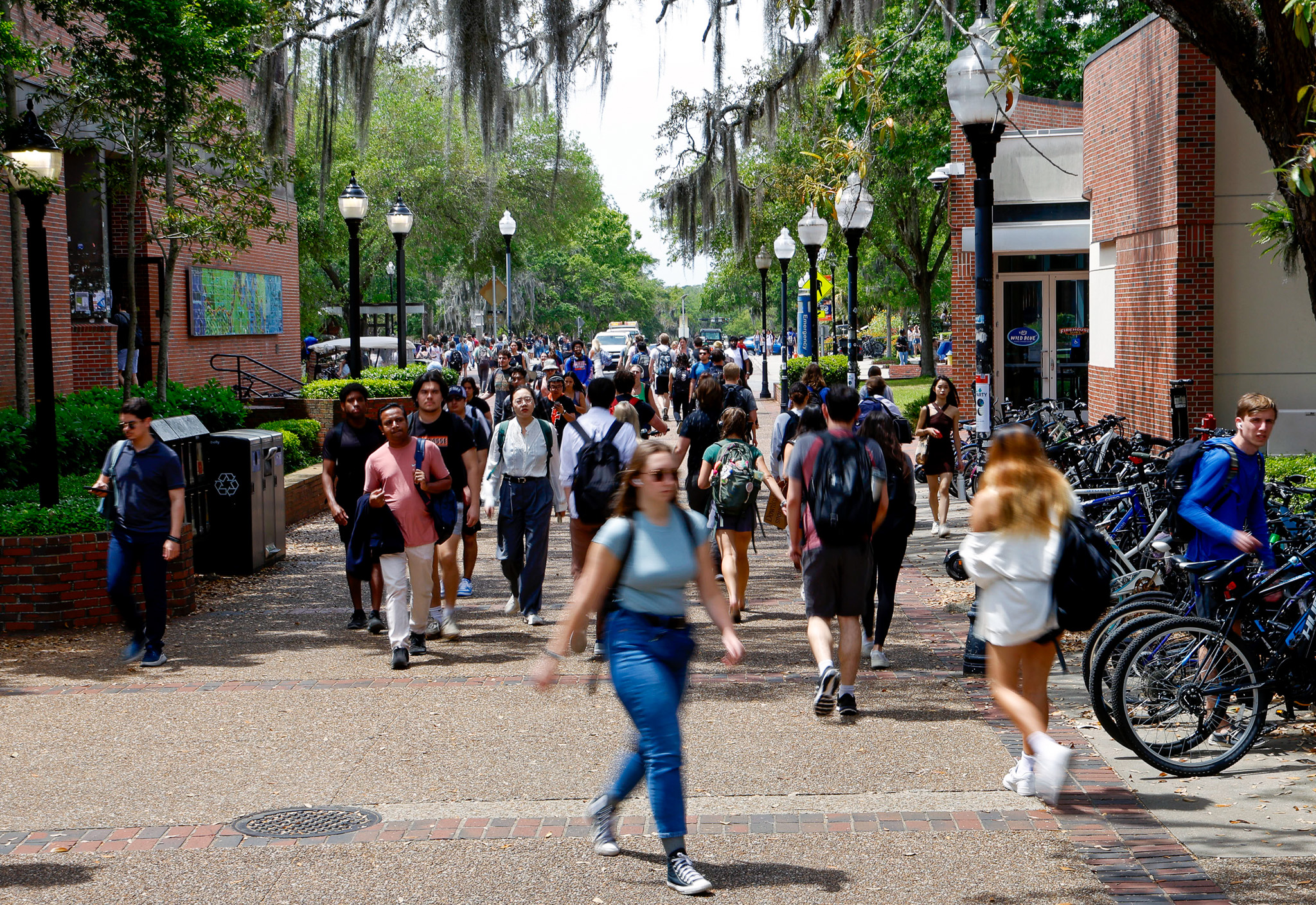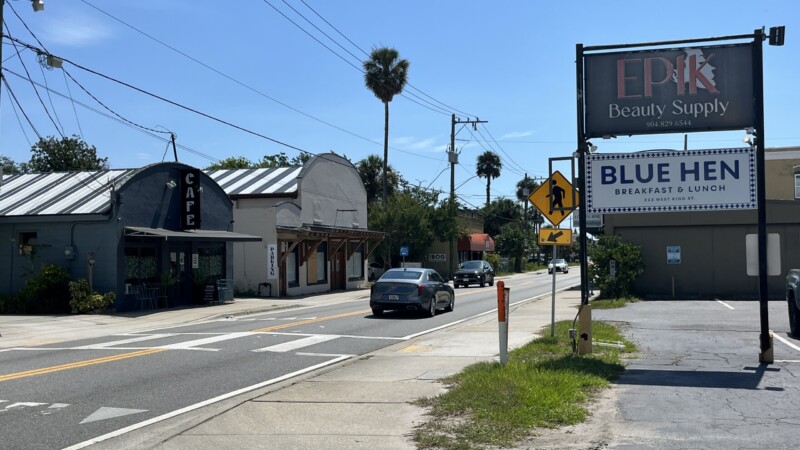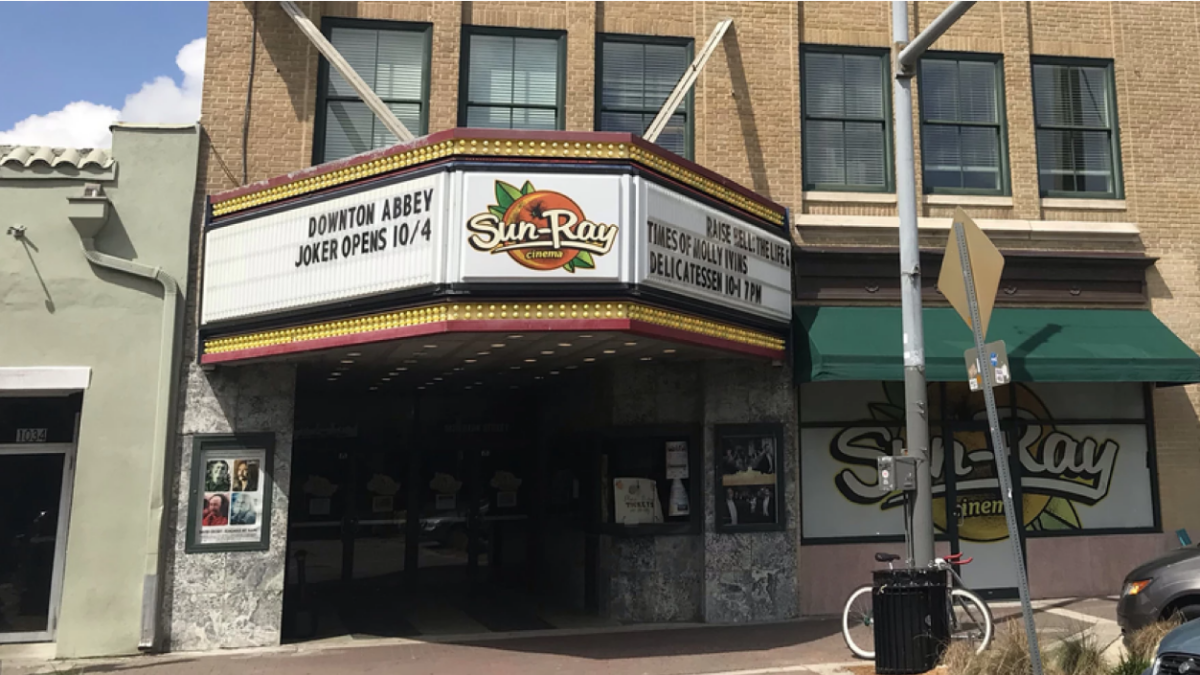The latest round of a controversial state survey of Florida college and university students includes a slew of new questions probing how their political views have affected relationships on campus — and whether it’s hard to be friends with people who have voted for Joe Biden or Donald Trump.
The anonymous and voluntary annual survey — which is loaded with ideological political and free speech questions — was distributed by email and text to public higher education students and was to be completed by Friday. Some students said they viewed participation in the survey as a responsibility. Others, along with faculty members, expressed skepticism about the survey’s content, methodology and security.
Florida temporarily suspended the “intellectual freedom and viewpoint diversity” survey last year after distributing it for the first time in 2022, with a response rate of roughly 2 percent for students. The annual surveys are mandated by a law signed by Gov. Ron DeSantis in 2021 following Republican state lawmakers’ concerns about conservative views being suppressed on college campuses.
The law requires that the Board of Governors and the Board of Education “annually assess intellectual freedom and viewpoint diversity at certain institutions.” Faculty have yet to receive a survey this year as the law requires.
The student survey this year has 52 questions, more than double the previous version.
The Biden-Trump questions are asked separately. The survey says, Do you agree or disagree with the following statement: “It’s hard to be friends with people who voted for Joe Biden” and then the same question with Trump’s name instead of Biden’s. Students are given a range of possible answers, from strongly agree to strongly disagree.
“The fact that they actually named the presidents — it really rubbed me the wrong way,” said Noah Barguez-Arias, 23, of Miami, a graduate student at the University of Florida.
“It’s kind of gross, it’s kind of slimy,” she added. “I feel like the universities just shouldn’t really worry about that. … It doesn’t really matter what political beliefs or whatever identifying thing students believe in or what their professors or (administration) believe in as long as everyone is safe from harm.”
Some other new politically pointed questions ask whether the student has been socially excluded, harassed or threatened for sharing political views, lost friends because of their political beliefs and witnessed students with either liberal or conservative views receive “uncivil treatment.”
The survey also contains several new questions this year related to protests and freedom of speech on campus. It asks what actions are appropriate to challenge demonstrators or speakers, including using violence or attempting to block other students from attending an event, and what students think of how their administration has handled such matters or how they should.

Graduate Assistants United Co-President Cassandra Urbenz stands on campus at the University of Florida in Gainesville on Tuesday, April 16, 20204. Urbenz has taken a firm stance on refusing to take the DEI survey sent out by the university. | Sydney Johnson, Fresh Take Florida
And it asks students about their comfort level in disagreeing with a professor on a controversial topic and expressing their opinions because of fear of reprisal.
“We didn’t want our members to be taken advantage of for any political interest at all, so we felt the need to communicate that to our members,” said Cassie Urbenz, communications co-chair of UF’s Graduate Assistants United, which urged members not to take the survey. “The data can very easily be manipulated.”
In a statement about the survey, a representative of the Florida College System, which includes 28 public community and state colleges, said colleges and universities should be where students are taught how to think, not what to think.
“The college campus is supposed to be a place where ideas can be freely discussed, weighed against each other, and informed conclusions can be drawn, and no student should feel alienated or persecuted for expressing their opinions in their college institutions,” the statement said.
Deanna Michael, an associate professor of higher education and policy at the University of South Florida, said too many of the survey questions focus on the dynamic between liberals and conservatives.
“Intellectual freedom and diversity is not really about political thought,” said Michael, a past chair of the Board of Governors’ Advisory Council of Faculty Senates, adding that she isn’t sure whether she will take the survey this year.
On campuses, conservative students welcomed the questionnaire.
Natalie Schiffer, a 22-year-old University of Central Florida senior and president of her university’s chapter of the conservative group Turning Point USA, took the survey using a link sent to her via text. She encourages every student to participate.
Schiffer said she often feels uncomfortable expressing conservative views on campus and added that she has been flipped off by students for being affiliated with Turning Point USA. During lectures, she said, one of her professors frequently expresses his progressive beliefs.
“There are times when I feel that I cannot talk about the clubs I am involved in or I cannot speak on certain things out of fear of getting failed or having someone be mean or nasty to me,” she said.
Owen Girard, a 19-year-old junior at Florida State University and president of his university’s Turning Point USA chapter, said he believes students’ First Amendment rights are at risk with the growing political division on college campuses, making participation in the survey a civic duty.
“You’re an American citizen, first and foremost, and your rights need to be protected,” he said.
Unlike students at the University of Central Florida and the University of Florida, who received the survey through both text and email, Girard received only an email notification. He said he wishes FSU had made more effort to promote the survey, such as by texting students.
Meanwhile, some critics have questioned whether the survey is anonymous as state education officials insist, and expressed doubts about the quality of its methodology.
The lengthy survey also contains an instance in which information is supplied to the student ahead of a question. Before question 49, the survey offers data that purports to be about professors’ alleged party affiliation, saying in part, “A recent national survey of university faculty found that about 56% of professors are Democrat, 16% are Independent, and 27% are Republican.”
No source for the information is provided and the question asks students if they agree or disagree with the statement: “My college or university should take action to promote political diversity among its faculty.” Providing information immediately before a question is a dubious methodological technique that can be used to manipulate polling or survey results. It is known as “push” polling because it pushes the respondent toward a desired answer, rather than simply measuring their opinion.
Michael noted that she believed the 2022 survey was not vetted through an independent review process to determine whether proper precautions had been taken to ensure no personally identifiable information about participants, such as IP addresses, was being collected or stored. It is unclear whether this year’s survey underwent a review process and state officials did not respond to questions about it.
“If it’s going to be anonymous, really make it anonymous” to protect participants from any “negative repercussions,” Michael added.
Cassandra Edwards, a spokesperson for the Board of Governors, said in a statement that the survey is anonymous. She did not respond to efforts to contact her with additional questions.
Stephen Craig, a political science professor at the University of Florida and expert in question writing for survey research, said he was concerned about the lack of answer options on some of the questions about political views and that some could be confusing.
For instance, he cited the question, “Which of the following statements comes closer to your own personal opinion?”
Students could select from only two possible answers: “Speech is violence and should be treated as such by the university” or “It is important for a healthy campus life that the distinctions between speech and violence are maintained.”
“You not only have to write a question that gets at what you’re trying to measure,” he said, “but you need to do it in good conversational language and make it clear as it can be. ‘Speech is violence’ is not clear.”
This story was produced by Fresh Take Florida, a news service of the University of Florida College of Journalism and Communications. The reporters can be reached at lauren.brensel@ufl.edu and afriedman1@ufl.edu.






